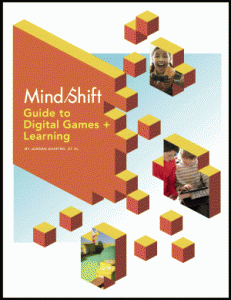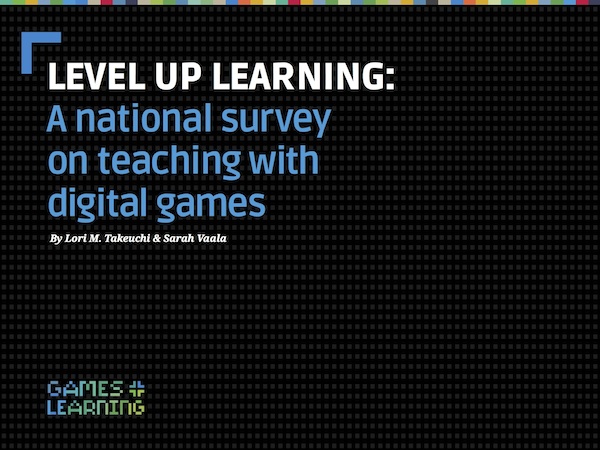
How can games unlock a rich world of learning? This is the big question at the heart of the growing games and learning movement that’s gaining momentum in education. The MindShift Guide to Digital Games and Learning [PDF] explains key ideas in game-based learning, pedagogy, implementation, and assessment. This guide makes sense of the available research and provides suggestions for practical use.
The MindShift Guide to Digital Games and Learning started as a series of blog posts written by Jordan Shapiro with support from the Joan Ganz Cooney Center at Sesame Workshop and the Games and Learning Publishing Council. The PDF brings together highlights of Jordan’s reporting to create a dynamic, in-depth guide that answers many of the most pressing questions that educators, parents, and life-long learners have raised around using digital games for learning. While we had educators in mind when developing this guide, any lifelong learner can use it to develop a sense of how to navigate the games space in an informed and meaningful way.
The MindShift Guide to Games and Learning (PDF)
The blog posts are available below:
- Tapping Into the Potential of Games and Uninhibited Play for Learning
By now, you’ve probably heard the buzzwords: “game-based learning” and “gamification” are pervading headlines in education coverage. Video games have always been popular with kids, but now increasingly, educators are trying to leverage … - How Games Lead Kids to the Good Stuff: Understanding Context
Those who still think of content as the driving force of education may not be ready for game-based learning. What do we mean by “content”? In this age of digital media, “content” is what web designers, TV producers, and media moguls … - Math, Science, History: Games Break Boundaries Between Subjects
By now, you’ve probably heard the buzzwords: “game-based learning” and “gamification” are pervading headlines in education coverage. Video games have always been popular with kids, but now increasingly, educators are trying to leverage … - Social And Emotional Benefits Of Video Games: Metacognition and Relationships
For years, most people thought that video games were like candy: mostly bad, tempting to children, but okay in moderation. Now we understand that they can have more “nutritional” value than our parents ever imagined. My brothers and I played Space … - Can Games Make High-Stakes Tests Obsolete?
Nobody likes high-stakes testing. The problems are well documented. But maybe games can help to change the way we approach assessment. At least since John Dewey, educational theorists and scholars have been clear about the inherent shortcomings of thinking about education … - Making Games: The Ultimate Project-Based Learning
As game-based learning increases in popularity, it’s easy to get pigeon-holed into one particular way of thinking about it or one way of employing it. This is true regardless of how teachers feel about gaming in the classroom, whether they’re for … - Benefits of Gaming: What Research Shows
Games and learning advocates often come up against the video game stigma. Despite the fact that we’ve now seen decades of game play, and that a generation of gamers has grown up without a civilization collapsing, the bad reputation persists — … - Digital Games and the Future of Math Class: A Conversation With Keith Devlin
Keith Devlin is a well-known mathematician and the author of many popular math books. He is co-founder and Executive Director of Stanford University’s Human-Sciences and Technologies Advanced Research Institute and is well known as the “NPR Math Guy.” He’s also … - Games In The Classroom: What the Research Says
The games-and-learning landscape is changing quickly. What’s happening in classrooms now will look very different in a decade, so what really matters right now is how we frame the conversation. The way we understand the expectations and promises of today’s game-based … - Games Can Advance Education: A Conversation With James Paul Gee
Most people involved with games and learning are familiar with the work of James Paul Gee. A researcher in the field of theoretical linguistics, he argues for the consideration of multiple kinds of literacy. The notion of “New Literacies” expands the … - From Mars to Minecraft: Teachers Bring the Arcade to the Classroom
Teachers have found many different ways of using digital games in the classroom. But what kind of games are these students playing? And how are teachers incorporating them in the classroom? Last year’s report from the Joan Ganz Cooney Center, “Games … - How Teachers Can Use Video Games In The Humanities Classroom
We often think about game-based learning as if video games can become robotic teachers. In the same way that software file systems have created more flexible and efficient file cabinets, we imagine that video games can make great instruction more scalable … - What Happens When School Design Looks Like Game Design
In education, it seems as if innovation and revolution play like the song of the Sirens in a culture of perpetual obsolescence. It seems as if we’ve got an unhealthy fetish for new-ness, indiscriminately choosing the convenient disposability of shrink-wrap over … - In the Bustling, Interactive Classroom, A Place for Digital Games
If there’s one thing we know for sure, it’s that today’s technologies will one day be obsolete — we shouldn’t be too enamored with any particular educational tool. Teachers will always play the most important role in the classroom. Although ed-tech … - Screen Time That’s Valuable For Young Kids
Most people agree that implementing game-based learning makes sense for older students, but what about really young kids? Do screens have a place in early childhood education? How young is too young for screen time? If you have small children, you … - How To Choose A Learning Game
Many teachers are excited about trying games in the classroom but don’t know where to begin. The landscape of learning games is vast and confusing — and it’s growing and changing rapidly. Moving at the pace of the software industry, games … - Video Games and the Future of the Textbook
The textbook is a problem that consistently plagues classrooms. At best, textbooks are innocuous, offering simple summaries of a very broad subject area. At worst, they oversimplify things, providing less information than an encyclopedia article without enough nuance or context to … - Need Help Picking the Right Learning Game? Some Things to Consider
To make sense of the broad and complex world of games and learning, we’re inclined to create neatly organized lists and categories. The truth is that there are so many different kinds of learning games, it’s difficult to break them down … - Using Games for Learning: Practical Steps to Get Started
By now, you’ve probably read enough to be convinced that it’s worth trying games in your classroom. You understand that games are not meant to be robot teachers, replacing the human-to-human relationship. Games are a tool that teachers can use to … - Games in the Classroom: Overcoming the Obstacles
Even for educators who are excited about using games in the classroom, questions inevitably come up around the very real obstacles to implementation, and strategies for overcoming them. A recent survey from the Games and Learning Publishing Council asked 700 teachers …


